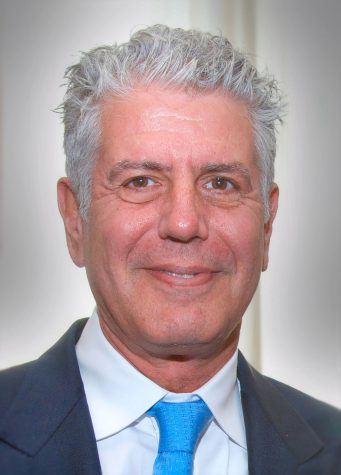Quiet life could be secret to happiness, peace
Steve Jobs smiles while showcasing the Apple product, the iPhone. Jobs is among many who change the world through the power of creativity.
Dec 7, 2018
Many of us want to change the world despite how unclear this path may be. In the search for answers, neuroscientist Dr. Nancy Coover Andreasen uncovered some interesting trends while studying creativity. She performed research on great thinkers, such as the writer Kurt Vonnegut. To the relief of many, her work has shown to be that of a “creative genius,” where you do not have to be that brilliant intellectually. It’s an idea called Threshold Theory. Dr. Andreasen describes the theory best, saying “above a certain level, intelligence doesn’t have much effect on creativity. Most creative people are pretty smart, but they don’t have to be that smart … An IQ of 120, indicating that someone is very smart but not exceptionally so, is generally considered sufficient for creative genius.”
 Photo courtesy of Wikimedia
Photo courtesy of Wikimedia
However, to the discomfort of many, what she found is the archetype of the tortured artist, the mad scientist or the struggling genius exists because of the real link between creativity and mental illness. She found “creative people are better at recognizing relationships, making associations and connections and seeing things in an original way — seeing things that others cannot see.”
However, these connections must be made by a brain that can deviate from the norm. People with these brains are great at making groundbreaking observations, but those connections are also the sign of an illness.
“Having too many ideas can be dangerous. Part of what comes with seeing connections no one else sees is that not all of these connections actually exist,” she said.
Get The Daily Illini in your inbox!
This explains why musicians and drug addictions or writers and suicide often go hand in hand. Conventional wisdom says these people start out normal but then become rich and famous. This leads to a hedonistic lifestyle or more famously put: sex, drugs and rock ‘n’ roll. But this is putting the cart before the horse. Degeneracy and creativity are two sides of the same coin.
Successful people also demonstrate the same tendencies as idealogues, and to be successful, you need to hold a belief dogmatically.
Take Steve Jobs for example. He was known for being stubborn and having a sense of infallibility. This helped him overcome adversity, like when he got fired from Apple, started a successful rival company and then got rehired.
However, the ideologue holds their beliefs despite any proof against it. This was true for Jobs, too.
When he found out he had cancer, he believed in his own ideas about medicine over the prognosis of his medical team. His “flower child” past taught him to be distrustful of conventional “Western” medicine, so instead of surgery, he began to take homeopathic remedies like “acupuncture, herbs, bowel cleansings and a special diet of carrots and fruit juices,” said Dr. Barrie Cassileth, a cancer researcher. “(Jobs) had the only kind of pancreatic cancer that is treatable and curable … He essentially committed suicide.”
The average person does not have the self-confidence to start two very successful tech companies, but the average person also does not have the self-confidence to believe they know better than their doctor.
 Photo courtesy of Wikimedia
Photo courtesy of Wikimedia
Dr. Andreasen recorded a similar anecdote about the famous mathematician John Nash, the subject of “A Beautiful Mind,” who you can thank for your mind-boggling differential equations or game theory homework, as he was essential to both of those fields. After his discoveries, he was hospitalized for paranoid schizophrenia.
While there, a fellow academic visited him and asked, “How could you, a mathematician, a man devoted to reason and logical truth, believe that extraterrestrials are sending you messages? How could you believe that you are being recruited by aliens from outer space to save the world?”
Nash had a simple response.
“Because the ideas I had about supernatural beings came to me the same way that my mathematical ideas did,” Nash said. “So I took them seriously.”
To become successful, you need to be able to have a superhuman courage in your convictions. This produces both cutting edge work no one else can see and conspiracy theories that do not actually exist.
There are a few hard truths from these stories about world-changing, successful people. First, there is a level of predestination to it. As a culture, we believe you write your own story, and this is one of the underlying assumptions of the American dream: there is a direct formula between hard work and how successful you are. But, as shown from Dr. Andreasen’s work, this is often more of an axiom than a fact. The qualities that made many great thinkers so creative was usually an inherited quirk — along with mental illness.
 Photo courtesy of Wikimedia
Photo courtesy of Wikimedia
Second, our culture has an unhealthy relationship with both happiness and success. As a 20-something, I have heard the phrase “Find what makes you happy and you will be successful at it” too many times. While, of course, there is happiness to be found after you complete a difficult task — though I would argue this can be better described as fulfillment — world-changingly successful people are slaves to their work.
The Calvinist nonsense we inherited teaches us that work is good, and moral. Sociologist Max Weber coined this idea and deemed it “the Protestant Work Ethic.” The natural conclusion of this theology is the even more dangerous “Prosperity Gospel” preached by those like Joel Osteen. Essentially, it is the idea that rich people are inherently moral because the richer someone is, the more work they have done. This is why the word successful is essentially synonymous with good person.
Happiness and success are not totally mutually exclusive. Bill Gates and Barack Obama are good examples of successful people living a happy life, even though they are the minority.
Choosing to live a normal and quiet life, a life not recorded in the history books and forgotten about after a few generations, may make you much happier than Ernest Hemingway or Nash ever was. The lives of all the people listed should hopefully put a nail in the coffin containing the idea that success will make you happy.
Writer Charles Bukowski, who spent most of his life undiscovered as a mailman, was an alcoholic filled with suicidal ideations. When he finally died (not by his own hand), he had “Don’t Try” written on his grave. This advice may seem counter-intuitive to a generation raised on “shoot for the stars,” but you may live a happier life following it.
Joseph is a junior in LAS.






